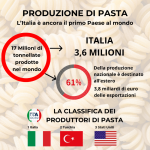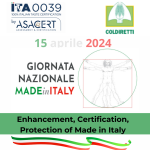Since the 1960s, the concept of sustainable agriculture has developed as a response to the industrialization of the countryside and the irresponsible consumption of natural resources. The idea of its possibility, gives birth to a new agriculture capable of responding to human needs, but more respectful towards the environment and health. This concept has been described not only as an achievable goal, but over the decades of research and application, it has built a solid foundation that still has enormous potential for future development.
Today Italian agriculture, is among the most sustainable in Europe, with an amount of emissions equal to 30 million tons of CO2 equivalent, significantly lower than those of France (76 million), Germany (66 million), United Kingdom (41 mln) and Spain (39 mln). The sector reduced the use of pesticides by 20% (2011-2018), compared to an increase in the other European countries (France and Germany), and also raised the use and production of renewable energy and lowered the consumption of water (Symbola data).
Around this time, news said that Italy might start implementing a sustainability certification system for the wine industry, following specific production rules. Making sustainable wine means working trying to preserve natural resources for future generations. It is a reasoned choice, and one of the best methods available at the moment (taken from tradition or from the be st innovations), with solid experimental foundations, which allow us to work for excellent product quality and with the lowest possible impact on the environment. It is based on a concept of integrated viticulture, that is an holistic conception of the entire production process and the surrounding environment.

With the «Relaunch» Decree on June 23rd, the Mipaaf issued one of the three administrative acts that lead to the full operation of the certification system for the sustainability of wines. To this will be added a further decree that proceeds to the constitution of the wine sustainability committee, which is entrusted with fundamental responsibilities to make the new device work.
The provision deals with sustainability at 360°, as it establishes that the specification must also take into account the area of food safety, the protection of workers and citizens.
ITA0039, with its relentless action in defense of healthy and sustainable agri-food goods, hopes for an ever greater commitment to combine productivity and environment, and exploit agro-energy so that the circular economy can close the circle. Thus generating supplementary and truly sustainable income, because truly Made in Italy agri-food productions are guarantors of a truly ecological and virtuous agri-culture. We are well aware that Italian tradition does not only speak of food: behind every dish or – in this case – bottle of wine there is the work of companies, families and workers who are committed to bringing authenticity to tables all over the world. Cheers!






